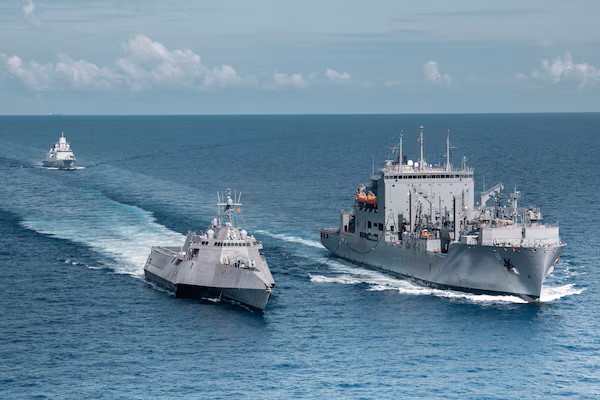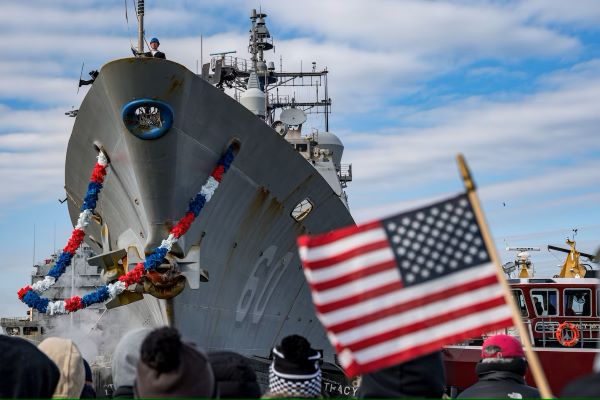SOUTH CHINA SEA — The Netherlands and United States’ navies conducted bilateral operations in the South China Sea on May 22.
Participants included U.S. Navy Independence-variant littoral combat ship USS Mobile (LCS 26), Lewis and Clark-class dry cargo ship USNS Wally Schirra (T-AKE 8) and Royal Netherlands Navy De Zeven Provinciën-class frigate HNLMS Tromp (F803).
[Photo above: The littoral combat ship USS Mobile (LCS 26), left, replenishes from the dry-cargo and ammunition ship USNS Wally Schirra (T-AKE 8) as the Royal Netherlands Navy frigate HNLMS Tromp (F803) follows in the South China Sea. US Navy photo]
“The Netherlands is one of our oldest, continuous bilateral relationships, stemming from the 18th century. I look forward to any opportunity to work together with partners and allies, especially at sea,” said Capt. Sean Lewis, commodore, Destroyer Squadron 7. “We share a deep commitment to maintaining stability and free use of vital sea lanes in the Indo-Pacific.”
The bilateral operation provided a valuable opportunity to improve allied interoperability and conduct complex scenarios to improve combined readiness.
“We’re fortunate to work together with allies and to have them provide replenishment to us. Operating together fortifies our existing relationship with our partners from the U.S.,” said Cmdr. Yvonne van Beusekom, Commanding Officer HNLMS Tromp. “We look to continue coordination between our nations to promote regional peace and stability in the Indo-Pacific region.”
The U.S. Navy regularly participates with allies and partners in high-end maritime exercises and operations, which have continued to grow in scale, scope and complexity, to create combined operations that enhance interoperability, boost deterrence and demonstrate shared resolve.
“We are fortunate to work with friends at sea in the region. Consistent collaboration makes us better as a crew and more capable as a joint force,” said Cmdr. David Gardner, commanding officer for Mobile. “Bilateral operations like these strengthen bonds with our Royal Netherlands Navy partners and deepen our understanding of how to operate together.”
During the operation, Commander, Destroyer Squadron 15 acted as a facilitator between DESRON 7 and the Netherlands. Multilateral operations improve interoperability between allied navies and support a free and open Indo-Pacific. These evolutions demonstrate the strength of regional partnerships, interchangeability and cooperation.
As the U.S. Navy’s forward-deployed DESRON in Southeast Asia, DESRON 7 serves as the primary tactical and operational commander of littoral combat ships rotationally deployed to the U.S. 7th Fleet area of responsibility, functions as Expeditionary Strike Group 7’s Sea Combat Commander and builds partnerships through training and exercises and military-to military engagements.



